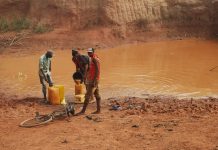Climate change poses a threat to economic growth and long-term prosperity of many countries around the world. Africa is not an exception, considering the actual and potential impacts of climate change and climate variability that will threaten its vulnerable sectors and human populations. African countries are projected to experience changing rainfall patterns, rising sea levels, and higher temperatures that will affect food security, agricultural production, water availability, and public health, among others. These climate change impacts and climate variability can further produce social and political problems, such as rural-urban migration and water resource disputes.
Alhaji mohammd Aribabowo is a Yoruba traditional title hold in Nigeria-west Africa, who embacked on Tress planting Campaign in kaduna state of Nigeria,and he told Journalists the importance of Tress planting in the community ”It must be noted that,Whether you plant trees around your home and property, in your community, or in our national forests, they help fight climate change. Through the natural process of photosynthesis, trees absorb CO2 and other pollutant particulates, then store the carbon and emit pure oxygen. See how planting trees helps fight climate change”
The monarch said ,Climate change is a phenomenon which in recent times has been drawing a lot of local and global attention all over the world. Due to its effects and consequences and the manner in which it threatens our world, many have found it imperative to inform and enlighten the world on Climate change. To be brutally honest,the African Continent has been at the brunt of many of the negative effects of Climate Change,just like the rest of the world…but we face these negative effects in multiple folds
Furthermore, the low levels of development in many African countries, as well as limited institutional, infrastructural, and technical capacities to respond successfully to climate change impacts and climate variability, can exacerbate the situation. In terms of contribution to greenhouse gas (GHG) emissions, although African countries are the lightest polluters, it has also become apparent that alternative energy sources can offset the increasing energy demand and dependence on biomass. Addressing climate change offers possibilities for low-carbon development. Moreover, there are promising mechanisms that can address both climate change actions and development goals simultaneously.
Another traditional Title Holder from Northern Nigeria Alhaji Ibrahim Gashash told journalist that “Adaptation to climate change includes all adjustments in behaviour or economic structure that reduce the vulnerability of society to changes in the climate system”adding that ,At the city level, strengthening resilience, or the ability to respond to and absorb the effects of a hazardous event in a timely and efficient manner and to sustain this ability in the future, and adaptation; the process of adjusting to actual or expected climate change stimuli or their effects, should be at the forefront of planning. Local governments have an important role to play through the provision of adequate infrastructure, regulation of land use, and other public services that are crucial for urban resilience. Mobilizing local governments, in collaboration with national governments, non-governmental organizations, and international organizations, among others, is also critical for an integrated multi-sectoral approach to climate change.
Gashash further pointed out that,Forests play an important an important role in climate change. The destruction and degradation of forests contributes to the problem through the release of CO2. But the planting of new forests can help mitigate against climate change by removing CO2 from the atmosphere. Combined with the sun’s energy, the captured carbon is converted into trunks, branches, roots and leaves via the process of photosynthesis. It is stored in this “biomass” until being returned back into the atmosphere, whether through natural processes or human interference, thus completing the carbon cycle



















